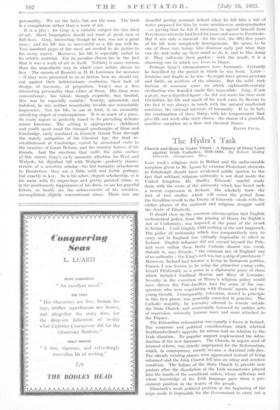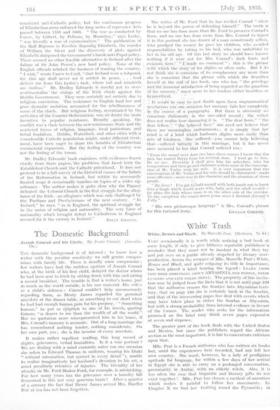Th e Hydra's Task
Church and State in 'Tudor Times : A History of Penal Laws
against Irish Catholics, - 1534-1603. By Robert Dudley Edwards. {Longman. 18s. ) • LAST week's religious riots in Belfast and the unfavourable reception given to Mr. Lyons by extreme Protestant elements in Edinburgh should have awakened public opinion to the fact that militant religious animosity is not dead inside the United Kingdom. Mr. Dudley Edwards' careful study deals with the roots of the animosity which has found such a. recent expression in Ireland. His scholarly book—the first of two studies which will cover the period from the Geraldine revolt to the Treaty of Limerick—deals with the, earlier phases of the national and religious struggle until the death of Elizabeth.
It should clear up the common misconception that English, ecclesiastical .policy, from the passing of Henry the Eighth's' Act of Uniformity, was imposed at the point of the sword • in Ireland. Until roughly 1.560 nothing of the sort happened. The policy of uniformity which was comparatively easy to carry out in England was virtually impossible to effect in Ireland. English influence did not extend beyond the Pale, and even within these limits Catholic dissent was vocal. Outside it, says Froude, "the common law of England was of no authority : the King's writ was but a strip of parchment." Moreover, Ireland had become a factor in European politics. Francis I was known to be using the attractive young exile, Gerald FitzGerald, as a pawn in a diplomatic game of chess which included Cardinal Beaton and Mary of Lorraine. Severity in the execution of Henry's religious policy would have driven the Pale-dwellers into the' arms of the con- spirators who were negotiating with Francis' agents and the young Gerald. Consequently, toleration, denied in principle in this first phase, was generally aclolnoeweedediasrpraaciiti ut iceo.'sfidehe. Catholic majority, by necessity allowed to em the State Church, and occasionally harassed by sudden acts of repression, naturally because more and more attached to the Papacy. The Edwardian reformation was equally a fiasco in Irehind. The economic and political considerations which whetted Northumberland's appetite for reform had no relation to the Irish situation. No popular support implemented the intro- duction of the new doctrines. The Church, in urgent need of internal reform, was utterly unprepared for the Reformation, which, in consequence, merely became a doctrinal volte-face. The already existing abuses were aggravated instead of being reformed and the Irish Church fell into an ailing and stricken condition. The failure of the State Church to provide new pastors after the dissolution of the Irish monasteries played into the hands of the mendicant orders, whose sufferings and whose knowledge of the Irish language gave them a pre- eminent position in the hearts of the people.
Elizabeth's weak political position at the beginning of the reign made it impossible for the Government to carry out a Mr. Dudley Edwards' book examines, with evidences drawn chiefly from State paPers,'the problems that faced both the EstabliShed Church and the Catholic priesthood. ' It 'does not pretend to be a full survey of the historical ea uses of the failure of the Reformation in ,Ireland, .but within its necessarily limited scope it occasionally touches on topics of a wider sig- nificance. The author makes it quite clear why the Papacy defeated the Colonial Church in the first struggle for the alleg- iance of the Irish—an allegiance which was only challenged by the Puritans and Presbyterians of the next century. " In Ireland," he says, " as in England, the spiritual struggle lay in the union of religion and nationality. The very force of nationality which brought defeat to Catholicism in England consistent anti-Catholic policy, but the continuous progress of Elizabethan arms enforced the long series of repressive Acts passed between 1559 and 1603. " The war as conducted by Carew, by Gilbert, by Pelham, by Mountjoy," says Lecky, " was literally a war of extermination." The publication of the Bull Begnans- in ExceThis -deposing Elizabeth, the. Murder of William the Silent and the discovery of plots against Elizabeth sharpened the Government's harsh anti-Papal policy. There seemed no other feasible alternative in Ireland after the failure of Sir John Perrot's new land policy. None of the English officials relished the business of wasting the country. "I wish," wrote Carew to Cecil, "that Ireland were a fishpond, for ..this age shall never see it settled in peace. . . . God deliver me from this hydra's task, where toil and mischiefs are endless." Mr. Dudley Edwards is careful not to over- sentimentalize' the risings of the Irish chiefs against the Dublin Government. They were certainly not entirely due to religious conviction. The resistance to English land law and pure dynastic ambition accounted for the rebelliousness, Of some of the chiefs. But religious feeling, accentuated by the activities of the Counter-Reforthation, was no doubt the main incentive to popular resistance. Broadly. , speaking, the conflict was"a clash between the new renaissance State and the scattered forces of religion, language, local 'patriotism, and, tribal feudalism. • DUblin, Waterford, and other cities with , considerahle Catholic popUlation might, under different treat-,
have been eager to share the benefitS'of Elizabethan, commercial expansion. . But the feeling of the country was not the feeling of the towns.
secured for it the victory in Ireland." c
.7.ALLY GRAVES,






































 Previous page
Previous page